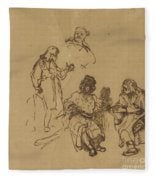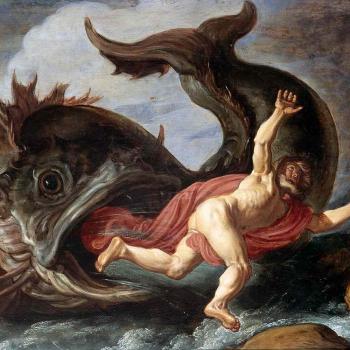Joseph Interprets Two Prisoners’ Dreams
40 Some time after this, the cupbearer of the king of Egypt and his baker committed an offense against their lord the king of Egypt. 2 And Pharaoh was angry with his two officers, the chief cupbearer and the chief baker, 3 and he put them in custody in the house of the captain of the guard, in the prison where Joseph was confined. 4 The captain of the guard appointed Joseph to be with them, and he attended them. They continued for some time in custody.
5 And one night they both dreamed—the cupbearer and the baker of the king of Egypt, who were confined in the prison—each his own dream, and each dream with its own interpretation. 6 When Joseph came to them in the morning, he saw that they were troubled. 7 So he asked Pharaoh’s officers who were with him in custody in his master’s house, “Why are your faces downcast today?” 8 They said to him, “We have had dreams, and there is no one to interpret them.” And Joseph said to them, “Do not interpretations belong to God? Please tell them to me.”
9 So the chief cupbearer told his dream to Joseph and said to him, “In my dream there was a vine before me, 10 and on the vine there were three branches. As soon as it budded, its blossoms shot forth, and the clusters ripened into grapes. 11 Pharaoh’s cup was in my hand, and I took the grapes and pressed them into Pharaoh’s cup and placed the cup in Pharaoh’s hand.” 12 Then Joseph said to him, “This is its interpretation: the three branches are three days. 13 In three days Pharaoh will lift up your head and restore you to your office, and you shall place Pharaoh’s cup in his hand as formerly, when you were his cupbearer. 14 Only remember me, when it is well with you, and please do me the kindness to mention me to Pharaoh, and so get me out of this house. 15 For I was indeed stolen out of the land of the Hebrews, and here also I have done nothing that they should put me into the pit.”
16 When the chief baker saw that the interpretation was favorable, he said to Joseph, “I also had a dream: there were three cake baskets on my head, 17 and in the uppermost basket there were all sorts of baked food for Pharaoh, but the birds were eating it out of the basket on my head.” 18 And Joseph answered and said, “This is its interpretation: the three baskets are three days. 19 In three days Pharaoh will lift up your head—from you!—and hang you on a tree. And the birds will eat the flesh from you.”
20 On the third day, which was Pharaoh’s birthday, he made a feast for all his servants and lifted up the head of the chief cupbearer and the head of the chief baker among his servants. 21 He restored the chief cupbearer to his position, and he placed the cup in Pharaoh’s hand. 22 But he hanged the chief baker, as Joseph had interpreted to them. 23 Yet the chief cupbearer did not remember Joseph, but forgot him.
Joseph Interprets Pharaoh’s Dreams
41 After two whole years, Pharaoh dreamed that he was standing by the Nile, 2 and behold, there came up out of the Nile seven cows, attractive and plump, and they fed in the reed grass. 3 And behold, seven other cows, ugly and thin, came up out of the Nile after them, and stood by the other cows on the bank of the Nile. 4 And the ugly, thin cows ate up the seven attractive, plump cows. And Pharaoh awoke. 5 And he fell asleep and dreamed a second time. And behold, seven ears of grain, plump and good, were growing on one stalk. 6 And behold, after them sprouted seven ears, thin and blighted by the east wind. 7 And the thin ears swallowed up the seven plump, full ears. And Pharaoh awoke, and behold, it was a dream. 8 So in the morning his spirit was troubled, and he sent and called for all the magicians of Egypt and all its wise men. Pharaoh told them his dreams, but there was none who could interpret them to Pharaoh.
9 Then the chief cupbearer said to Pharaoh, “I remember my offenses today. 10 When Pharaoh was angry with his servants and put me and the chief baker in custody in the house of the captain of the guard, 11 we dreamed on the same night, he and I, each having a dream with its own interpretation. 12 A young Hebrew was there with us, a servant of the captain of the guard. When we told him, he interpreted our dreams to us, giving an interpretation to each man according to his dream. 13 And as he interpreted to us, so it came about. I was restored to my office, and the baker was hanged.”
14 Then Pharaoh sent and called Joseph, and they quickly brought him out of the pit. And when he had shaved himself and changed his clothes, he came in before Pharaoh.
Genesis 40:1-41:14
I don’t typically pay much attention to my dreams. Like most of us, I tend to forget them the moment I wake up. The rest of them are usually a train wreck between an attic and the Victoria and Albert Museum. But occasionally they stick, and they seem to have a clear meaning. When I moved from Washington, DC and the National Cathedral to Dallas, Texas and Southern Methodist University, I had one of those meaningful dreams.
I had prayed a lot about the move and I was certain that vocationally it was the right choice to make. I had really enjoyed being on the Cathedral staff, and there is nothing like the National Cathedral in the United States. But my role as Canon Educator entailed building public programs, and I was fast becoming Oprah Winfrey to the theologically acute masses. I was certain that the move to SMU (although it was a Methodist institution) would make it easier to live out my vocations as a priest and as an academic.
But it was a big adjustment and Texas, itself, requires a bit of eye adjustment. You can see forever. Most of what counts as trees look like over-grown shrubs. And the weather is bi-polar. I arrived in the middle of 89-day drought that finally broke with torrential thunderstorms and baseball-sized hail. So, I was really struggling to “feel” what I “knew” was the right move.
Then one night I dreamed that I was back at the Cathedral. The feelings associated with the dream were more important than what happened. I felt elated to be back. But the moment I sat down at my desk, I could hear an inner voice say, “You’ve done everything you can here.” And I no more than realized that the voice was right, than I woke up. I thought to myself, “Well, God bless Texas!”
I tell you this story, because I think that for most of us, the persistent emphasis on dreams in the Joseph saga strike us as far-fetched. But all of us have at least one dream that is meaningful to us and others have a lot of them. Dreams are the product of our subconscious. Our minds continue to work on problems and challenges. And I am convinced that God speaks to us through them – sometimes, even more effectively than in conscious moments, because our defenses are down and we are open to hearing what God has to say to us.
Joseph also lived in a culture that was ready to hear the voice of God. People who are not religious are convinced that this doesn’t happen. And it doesn’t in the lives of people who don’t believe it is possible, because they aren’t open to the possibility anyway. A person who thinks that art is rubbish and a waste of time, won’t see anything of value in a painting. And people who have a tin ear or little or no experience with music are more likely to think that there is no music worth listening to. Joseph lived in a world where people believed that it was worth listening.
What unfolds in chapters 40 and 41, then, is driven by dreams. But this time, Joseph isn’t the dreamer. He is the interpreter of dreams. Having been framed by Potifar’s wife he is imprisoned in the “round house”, a prison that is as much pit, as it is jail. With apologies to Gilbert O’ Sullivan, Joseph must have thought, “In the pit, again, naturally”.
The titles of Joseph’s cellmates contribute to our understanding of the story. One is the Pharaoh’s Cupbearer, the other is his Baker. These men are not royalty, then, but they do work in the Pharaoh’s household. They have jobs that carry with them a measure of prestige and a modest claim of intimacy with the Pharaoh and the royal household. Think “Downton Abbey”, only ancient Egypt.
There is also another layer to their role, however, that has nothing to do with the servant class in “jolly old” England. Both of these men are responsible for what the Pharaoh consumes. And ancient intrigue being what it is, they are also charged with protecting the Pharaoh from being poisoned. The Cupbearer, for example, is a cross between a sommelier and a body guard. He is not only entrusted with choosing and pouring the Pharaoh’s wine, he is charged with sampling it, just in case it is poisoned. And the Baker had similar responsibilities.
After some days, Joseph approaches them. The fact that he does this makes clear that Joseph is a different man than the entitled kid with the electric coat. In the past, he had the dreams and he co-opted his family, forcing them to the makeshift audience for stories in which he was the center of attention. But at the end of chapter 39 in Genesis we are told that the warden had put everyone in the prison in Joseph’s care, and that the Lord was with Joseph and gave success to his efforts.
So, this time, he is alert to those around him. And the man who has received mercy, shows mercy. Knowing this helps us understand why Joseph asks about his cellmates’ well-being. But Joseph’s question also displays new attentiveness to those around him.
He asks the two prisoners “Why are your faces downcast today?” The question not only suggests that Joseph has discovered new-found interest in others, but that he is also alert to smaller differences. The Hebrew word, raiym, which is translated “downcast”, is actually far more complex. It can mean “sad, angry, troubled or perplexed”, and it may suggest that Joseph can tell that cupbearer is genuinely mystified that his master has imprisoned him, while the baker is angry that he has been discovered.
If that is the case, then the dreams that they describe and the interpretations that Joseph offers are certainly easier to understand. The Cupbearer may have fell foul of the Pharaoh’s enemies, or he may have simply missed something as small as a fly that took a swan dive into the Pharaoh’s wine. But if the Baker put a stone into the Pharaoh’s bread in order to choke him, then it was more likely a matter of premeditated murder or a scheme to increase the weight of the flour and charge the Pharaoh’s household for more.
In response to Joseph’s inquiry, his cellmates tell him that they have “dreamed a dream”, and the Cupbearer asks Joseph to “solve” the dream. The way that he asks for Joseph’s help suggests that what he expects is the kind of help that Egyptians of the day typically provided. Dreams were meant to be deciphered or decoded; and schools called “houses of life” were designed to train specialists in the technique of “solving dreams”. Joseph makes every effort to help the Cupbearer, but he is also clear that the help he will provide is given to him by God: “’Are not solutions from God?’” The expression “we have dreamed a dream” also suggests that the two servants may have seen their dreams as two parts of the same dream or as somehow alike. And it suggests that they view their dream as a window into their shared fate.
As it turns out, however, their dreams reflect very different outcomes, driven, perhaps, in part by the fact that the one has a clear conscience and the other does not. This may also explain why the Baker waits to ask for Joseph’s help.
The dreams themselves contain common elements and great differences. Both dreams allude to three days. The imagery alludes to their respective roles: the one features grape vines, the other features baskets of bread and bakery goods. In both dreams the Pharaoh “lifts up” their heads. But the one “lifting-up” leads to recognition, restoration, and trust, while the other gives way to execution and the attention of vultures.
Despite Joseph’s request that the Cupbearer remember him, he forgets Joseph. It is two years before another opportunity presents itself and this time, it is the Pharaoh that has a dream. It is urgent need for an interpreter that prompts the Cupbearer to recommend Joseph and he is invited to help.
Significantly, even though Joseph prepares himself for his appearance in the Pharaoh’s court in the way that any Egyptian would – insuring for example, that he is clean-shaven – he doesn’t forget that he is dependent upon God. When Pharaoh suggests that Joseph will be the solution to his problem and asks him to interpret his dream, Joseph is just as pointed as he was with the Cupbearer and Baker: “Not I. God will answer for Pharaoh’s well-being.”
So, listening with the story of Joseph, the interpreter of dreams, what can we learn? It’s a story, of course, and like all good stories the lessons aren’t there on the surface in bold type. But let me put some of those lessons in that form, so that we don’t lose track of them:
One, listen to your dreams.
If you are like me, there are times when they won’t have much to tell you. Often you won’t remember them and if you don’t focus on them right away when you wake up, they are easy to forget. But if you have one that is vivid and speaks in meaningful ways to your life, God may be trying to tell you something.
Two, find someone to listen to them with you.
Those who know you and love you may hear things that you can’t. And even if all that they do is affirm the message you are hearing, then, the confirmation can be helpful. Also: If what you hear involves change and commitment, it is valuable to have friends who can hold you accountable.
Three, and more broadly, remember to be faithful, even if you think you might be forgotten.
It is easy to read the story of Joseph and assume that Joseph was forgotten so that the Cupbearer remembered him at just the right time. That might be the case. But I doubt it. It was, in fact, wrong of him to forget Joseph and it is more likely that he chose not to remember him. If there had not been an advantage to him in helping the Pharaoh, I doubt that he would have ever said anything. It is also important to remember that the two additional years in prison were undoubtedly lonely and unproductive for Joseph. But the message of Joseph’s story is that being remembered by others is not the point. The point is being faithful. Joseph had learned, whatever our circumstances, the key to moving forward in life is put ourselves back into God’s hands. And that can only be done by being both consistent and faithful.
Four, remember when you are blessed, pay it forward.
We are blessed to be a blessing. Joseph reflects this conviction in the active interest that shows in his cellmates’ disposition. And a missed opportunity – as well as the consequences – are evident in the forgetfulness of the Cupbearer. God is gracious and because God is gracious, we are called show grace to others.
Fifth and finally, remember even when things go wrong, God is still on our side.
The promise of the Old and New Testaments is not that faithfulness will be repaid in material terms. The logic of Scripture is that a life of wisdom and meaning begins with acknowledging that there is a God and that we are not.
Dag Hammarskjöld, who was Secretary General of the United Nations, from 1953 to 1961 put it succinctly: “God does not die on the day when we cease to believe in a personal deity, but we die on the day when our lives cease to be illumined by the steady radiance, renewed daily, of a wonder, the source of which is beyond all reason.” Hammarskjöld was right. We all die. But we need not die to truth, beauty, and wisdom. Nor do we need to grieve without hope.
And Joseph understood this. We may find ourselves in a pit more than once in our lives. But we do not need to be alone or without direction.
The image is by Rembrandt
Some useful sources on the Joseph saga:
https://jibs.hcommons.org/2022/11/02/4-2-homrighausen-forgetting-the-forgetter/
https://www.bethmelekh.com/yaakovs-commentary/genesis-40-interpreter-of-dreams














